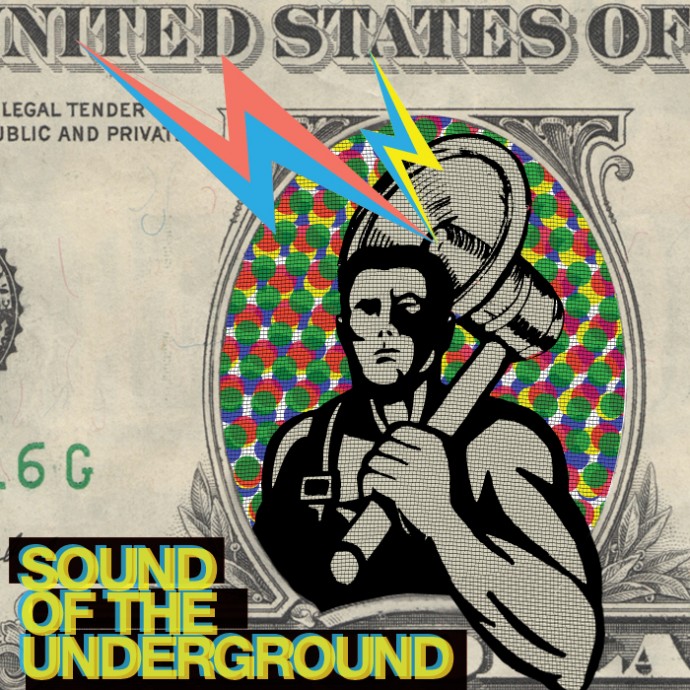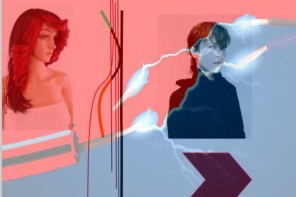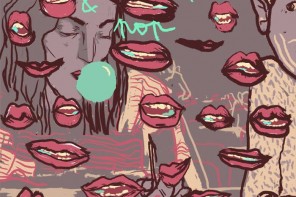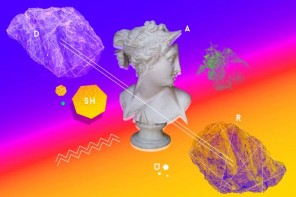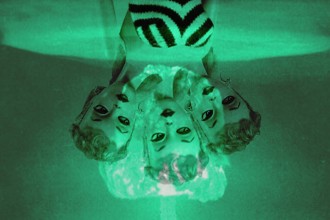You can fill your hard drives up with pirated music in an instant with downloading software these days. This slugs a huge financial blow to the music industry as a whole. However, when it comes to underground music communities, there is not a lot of money circulating there anyway—and so they are driven to work in a different way. With a sense of determination, artists are bringing the focus back to the community. Still, finding a way to sustain themselves in a new and constantly evolving movement requires continual leaps into the unknown. Ryan, the founder of Unrepresented Music (whose alter-ego is Junkie Kut, a zombie cyborg on crystal meth), talks to Sensa Nostra about the contrasting values, challenges, and compromises alternative musicians must understand to allow themselves and their communities to flourish.
I’m an experimental electronic musician and independent label manager. The point of the label is to have a professional representative in the music industry to work with artists who don’t fit neatly into stereotypical genres or pigeonholes, and border on the extreme in some sense. I think that subgenres are at risk of being lost in the underground without having a respected, professional label to help bring them into the worldview. I try to build the profile of unheard artists and make them realise their work is a big deal. I feel it is important as an underground musician to have a network of support, which is why I built this framework.
I feel the artist should always be the one who has the final say in how their creative lives should be run, and the label should be there to facilitate that and offer suggestions and advice. It’s becoming harder for future musicians to make their work a full-time reality, which is a real shame, as I think that in order to be the best you can be, you need to give it every hour you’ve got. 9 to 5 for creativity. Fresh music is guaranteed to keep coming, but even an underground label has a job to comment on the works of an artist. It’s what we call ‘artist development’. I feel it has to be constructive, rather than threatening or limiting. I didn’t have guidance when I started out, and had to give myself exposure against the odd. I had the plug pulled many times, and struggled with getting anyone to pay attention to what I felt was novel and important.
There are some big labels that will pick up alternative music, but none are prepared to work with niche music, such as extreme electronic crossover music styles, that I am compelled towards. Signing to a mainstream label may seem appealing but would result in making too much of a compromise. The label has to ‘market’ the music and stuff it into categories to sell products and performances, but I feel the artist shouldn’t be made to do anything that doesn’t feel right, because it distorts their vision. Alternative music doesn’t mean any particular genre at all, but the abolition of music genres themselves. It simply means, ‘the other stuff’. Alternative music is reactionary and edgy by its very nature, so anything is permitted. It touches upon a sense of diverging from a dead end, creatively. In a world where music is sold by genre, the only true ‘alternative’ music styles are ones that do not care for the rules and limitations of genre boxes. For example, if an artist genuinely feels drawn to write some pop-dubstep—which is generally regarded as a commercial sound—when they usually produce dark or extreme sounds, then that’s ‘alternative’, so long as their passion is to keep evolving and not subscribe to a particular genre. While there is a drive to identify with a movement or tribe, there will be genres! People love them and suck them up. While these are great tools for labels to use to get people interested in your music, it also entraps artists and fans within ego structures. I think that individuality is essential for a community’s evolution, to spark up new ideas, interests, and inspirations. There are always rules to be broken. I also think that there is so much music in the worldwide archive that we can touch upon to keep things fresh—for example, Russian opera in Japanese industrial pop. There’s always stuff to use from what has been done before. Past, present, and future are naturally all essential to the innovation process.
Listeners and fans becoming separated due to an artist’s exploration happens a lot. You always get ‘purists’ within any music scene, and aiming to please these people is very limiting for an artist and their personal evolution and experimentation. You have to think about what you’re doing this music for. Is it for others to enjoy, too? If you keep evolving and moving on, particularly if you are a prolific producer, your true fans will see through the illusion of the genre and will continue to follow you because of your unique style, attitude, approach, and technique. They may like some music more than others, but I think they will respect and appreciate the change. I think you can either love an artist or love their music… but of course it’s possible to love both, or neither!
As both a label manager and artist, I feel it’s also important to encourage things like image, style and the theatrics. What you see is important too. You go out and want to have a good time, or witness someone giving his or her soul, rather than lazily strumming or staring into a computer screen. I think that a moving musical sound plus a strong visual image is what takes people to the next level and separates them from the rest. My good friend Connor, of Drugzilla, once called the use of glamour and image ‘Peacock Syndrome’. People are attracted to who has the most colourful feathers or makes the most noise. I feel it’s a primal element of being human. It’s all about giving the crowd a completely overwhelming sensory experience as much as you possibly can, and to run with it, to whatever end! For me, performing is really liberating and the process is a ritual. Minutes before I go on stage, I breath and focus (almost meditate) in an effort to control the anxiety and adrenaline rush. Then I am given the freedom to be someone else. Manifesting an entity of a darker, more pissed off side of my character or personality is amazing and cathartic! It allows me to let off steam about the system and personal struggles in a positive outlet, without having to be emotionally involved with my ego. I can relate it to how the euphoric drug MDMA can transform your reality in a way that disconnects your emotions from your ego identity. This energy is contagious to the crowd.
I must confess that dealing with your own ego is otherwise really hard! I think you have to humble yourself and deeply appreciate everything that crossed your path, otherwise you can easily become corrupt to the core and self-obsessed. As with everything, you must strike a healthy balance. The ego is a good tool if kept under control, but that is so hard to do, which is why many reject it completely. Other peoples’ music egos don’t really bother me that much anymore, because it’s their own demise. They cast off all help and opportunity along the way because they believe that they are hard done by and deserve better. We all struggle with that, I guess. If people react negatively to my music, I have learnt to enjoy the fact that it’s moved them in some way. People react in different ways to different stuff. Some may feel terrorised, others will feel excited. It’s all valid, and if someone can’t handle it, then that’s their issue to deal with. Maybe it’s a part of them that they should be addressing that has been uprooted by the extreme sounds and challenging influence. It’s like a psychedelic trip!
In the long run, I would like to see more opportunities in the community for underground artists to perform and get paid for what they do. This is pretty difficult logistically and involves a lot of risk-taking and investment. However, it’s the fans and crowds that show up to shows amd buy music and merchandise that really help the artist. Without them, we are nothing. Selling yourself short can be really bad for you. For some reason, people still measure your value by how much money you make. I have played for free many a time and have not been offered anywhere to even sleep, let alone a good set time—you’re used to fill space on a line-up. In contrast, I have played for money too, and it’s amazing how different people react to you as an artist. Nowadays, I prefer to sort all the money bollocks out in advance, way before the show, so that I can meet the promoter or crew without that negative “they owe me something” specter looming over our relationship. It’s definitely a shift towards being more professional, and if I can achieve it, so can others. Part of what Unrepresented does is to try to guarantee that everyone leaves with smiles, feeling excited and inspired that the future is bright and that we can all do it again, but better, each and every time!

